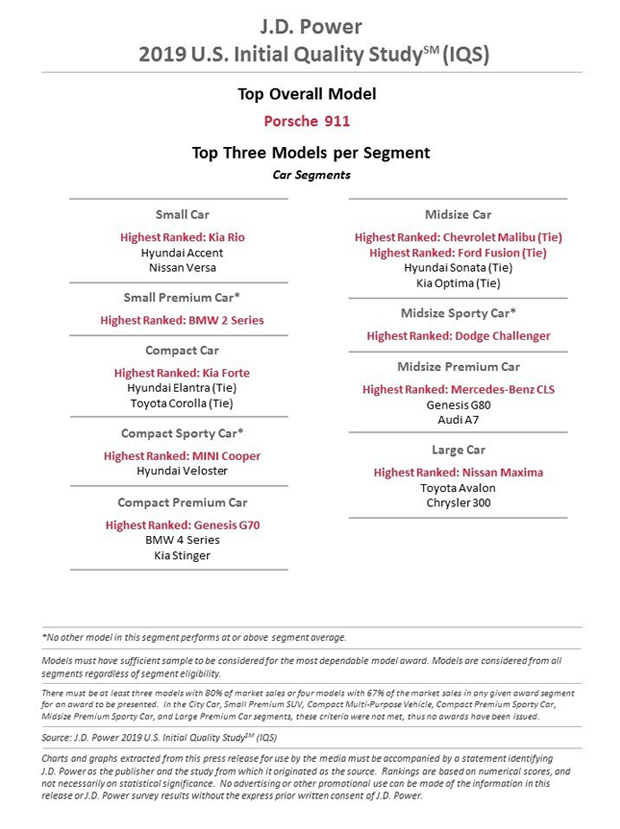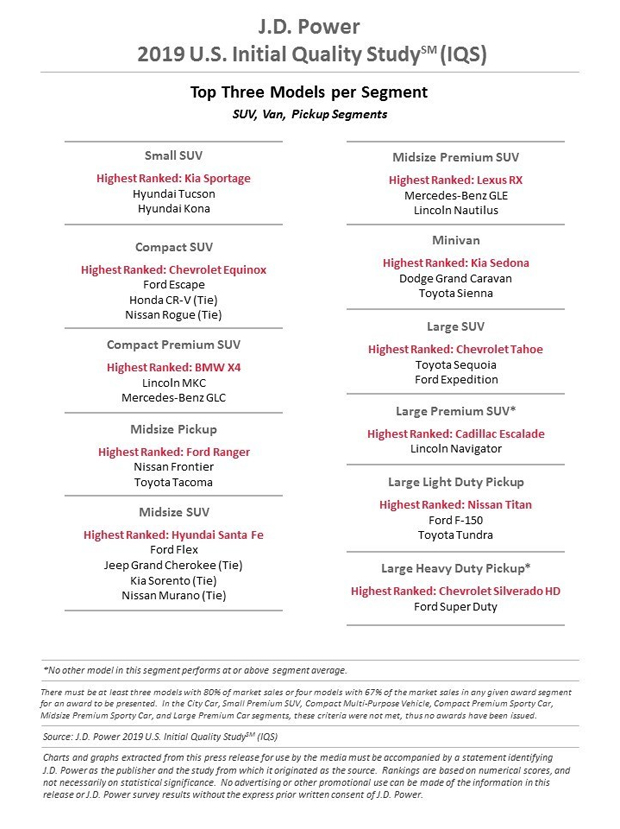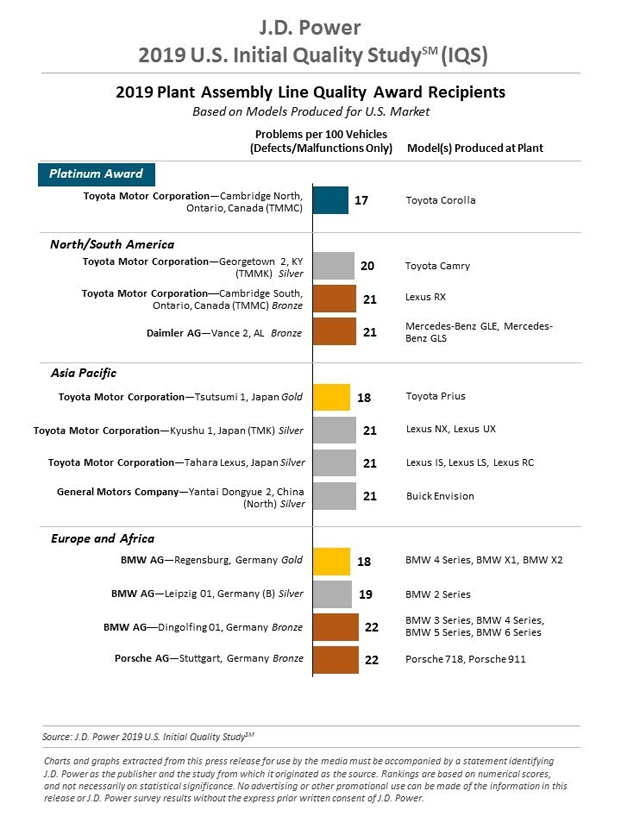New-vehicle quality in 2019 stays flat compared with 2018, marking the first year without improvement since 2014, according to the J.D. Power 2019 Initial Quality Study (IQS). More brands worsened than improved over the past 12 months.
“Automakers continue to make progress in areas like infotainment that attract a lot of consumer attention,” said Dave Sargent, Vice President of Global Automotive at J.D. Power. “However, some traditional problems crept up this year including paint imperfections, brake and suspension noises, engines not starting and the ‘check engine’ light coming on early in the ownership experience. Also, more people are having issues with their advanced driver assistance systems, which are critical for building consumer trust in future automated vehicles.”
Initial quality is measured by the number of problems experienced per 100 vehicles (PP100) during the first 90 days of ownership, with a lower score reflecting higher quality. In this year’s study, only 13 brands improved, while 18 worsened. The industry average remained unchanged at 93 PP100.


Following are key findings of the 2019 study:
- Gap between Korean brands and others continues to widen: The three highest-ranking brands—Genesis, Kia and Hyundai—are all from Korean manufacturer Hyundai Motor Group, and the gap between these three brands and all others has widened considerably. Remarkably, 16 of 18 models from Hyundai Motor Group rank in the top three in their respective segments. These vehicles tend to perform especially well in the areas of infotainment and other electronic components.
- Domestic brands above average: Ford (83 PP100), Lincoln (84 PP100), Chevrolet (85 PP100), Dodge (90 PP100) and Buick (92 PP100) all perform better than the industry average of 93 PP100. Overall, Domestic-branded vehicles perform close to the average in most areas.
- All European brands are below average: In contrast to the success of the Korean automakers and the leading domestic and Japanese brands, all 10 European marques are below average. The largest gaps for the European vehicles are infotainment and other electronics.
- Porsche 911 again achieves the best score of any model: The Porsche 911, with just 58 PP100, has the best score of any model for the second consecutive year.
- Infotainment problems are decreasing: Infotainment remains the most problematic category for new-vehicle owners. However, this area is the most improved from 2018, led by fewer problems for voice recognition and Bluetooth.
- Problems with driver assistance systems are increasing: As advanced driver assistance systems become more widespread and increasingly complex, more owners are indicating problems. The average for premium brands is 6.1 PP100, up from 5.0 last year, while the average for mass market brands is 3.5 PP100.
- New and redesigned vehicles still trail carryover vehicles: Vehicles that were launched in 2019 have an average problem level of 103 PP100, which equals the best score ever. However, this is still well below the score for carryover models, which have an average problem level of 91 PP100.


Highest-Ranking Brands and Models
Genesis ranks highest in overall initial quality with a score of just 63 PP100. Kia (70 PP100) places second and Hyundai(71 PP100) ranks third. This is the second year in a row that the three Korean brands are at the top of the overall ranking, and it is the fifth consecutive year that Kia is the highest-ranked mass market brand. Ford (83 PP100) ranks fourth and Lincoln (84 PP100) ranks fifth, marking the first time both Ford Motor Company brands place in the top five in the same year.
Land Rover is the most-improved brand, with owners reporting 37 PP100 fewer problems than in 2018. Other brands with strong improvements include Jaguar (18 PP100 improvement), and Dodge and Volvo (each with 8 PP100 improvement). This is the highest Dodge has ever ranked in the study.
The parent corporation receiving the most model-level awards is Hyundai Motor Group (six awards), followed by General Motors Company (five); BMW AG (three); Ford Motor Company (two) and Nissan Motor Co. Ltd. (two).
- Hyundai Motor Group models that rank highest in their respective segments are Genesis G70; Hyundai Santa Fe; Kia Forte; Kia Rio; Kia Sedona; and Kia Sportage.
- General Motors Company models that rank highest in their segments are Cadillac Escalade; Chevrolet Equinox; Chevrolet Malibu; Chevrolet Silverado HD; and Chevrolet Tahoe.
- BMW AG models that rank highest in their segments are BMW 2 Series; BMW X4; and MINI Cooper.
- Ford Motor Company models that rank highest in their segments are Ford Fusion and Ford Ranger.
- Nissan Motor Co. Ltd. models that rank highest in their segments are Nissan Maxima and Nissan Titan.
Other models that rank highest in their respective segments are Dodge Challenger, Lexus RX and Mercedes-Benz CLS.
Plant Quality Awards
Toyota Motor Corp.’s Cambridge North (Canada) plant, which produced the Toyota Corolla, receives the Platinum Plant Quality Award for producing vehicles with the fewest defects or malfunctions. Plant quality awards are based solely on defects and malfunctions, and exclude design-related problems.
Toyota Motor Corp.’s Tsutsumi 1 (Japan) plant, which produces the Toyota Prius and BMW AG’s Regensburg (Germany) plant, which produces the BMW 4 Series, X1 and X2, each receive the Gold Plant Quality Award for the Asia Pacific and Europe/Africa regions, respectively.
The 2019 U.S. Initial Quality Study is based on responses from 76,256 purchasers and lessees of new 2019 model-year vehicles who were surveyed after 90 days of ownership. The study is based on a 233-question battery organized into eight vehicle categories designed to provide manufacturers with information to facilitate the identification of problems and drive product improvement. The study was fielded from February through May 2019.













































































































